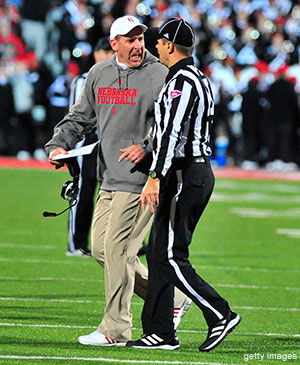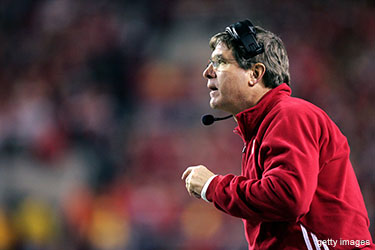Firing a nine-win football coach is risky. For starters, nine wins in college football will draw a good deal of support from any fan base, so you're facing the prospect of civil war.
Nine wins usually gets you to a decent bowl game, and it offers plenty of room to fall should the appointed successor prove a bad hire. When you fire a nine-win coach -- particularly one who reaches that mark with consistency -- schools imply that they'd rather risk getting worse than accept the same results every year.
And then there's the risk of alienating prospective coaches. How many coaches are eager for a job where winning 75 percent of your games gets you the ax? Who wants to be judged by a fan base whose standard of excellence resides in a bygone era that no longer exists?
Nebraska has faced all of these risks before, and its football program suffered greatly because of it. That's why the decision to fire Bo Pelini after seven seasons -- all of them at nine wins or better -- has whipped the fan base into such a fervor. Many Husker fans see Pelini's ouster as a turning point in the program. But sides are split on whether that's a good thing or a bad thing.
Bo Pelini is not a bad coach. He may be hard-headed, hot-headed, and short on social graces, but all things considered he's a good football coach. He came to Nebraska after winning a national championship as defensive coordinator at LSU and had a great resume that included one year as Cornhuskers defensive coordinator in 2003.

He was going to be a head coach somewhere, and Nebraska found Pelini when it needed him most. After the 2007 season, in which the Huskers set a school record for most points allowed in a season (including a record-breaking 76 points to Kansas) the program was in shambles. The football team's identity was gone. Its Blackshirt tradition was a joke. The team was 5-7, missing out on bowl season for the second time in four years.
Pelini came in and delivered a quick turnaround, going 9-4. The program capped off the 2008 season with a 26-21 win over Clemson in the Gator Bowl. The improvement was dramatic, and optimism for 2009 was high, especially when defensive star Ndamukong Suh decided to return for his senior season.
After a rocky first half of the season, Nebraska ripped off five straight and lost to Texas in a controversial Big 12 Championship game that fans still bring up with regularity. (A timing controversy gave the Longhorns one extra second at the end of the game, which they used to kick the game-winning field goal.)
After that, Pelini's tenure becomes something of a blur, a five-year stretch with few distinctive moments. The general pattern: Nebraska handles inferior opponents and gets crushed in games against ranked teams. The Huskers haven't beaten a Top 15 team since November 2011, when they beat Penn State in the school's first game after firing Joe Paterno.
Pelini becomes the first major-conference coach in at least 50 years to be fired (for on-field performance) without a 7-win season or worse.
— Dirk Chatelain (@dirkchatelain) November 30, 2014
Since the start of the 2011 season, Nebraska has lost seven games by 20 points or more. It's easy to make the case that Nebraska's nine wins are the product of a soft schedule and its alignment in the Big Ten's weak West Division.
Nebraska athletic director Shawn Eichorst is able to put Pelini's 67-27 record into perspective.
"We won a bunch of games," said Eichorst, "but didn't win the games that mattered most."
All of this has happened because there's a lot of money to be made in college football. You don't see softball coaches getting canned after winning 71 percent of their career game. That opinion is represented among Nebraska fans who presumably don't want to see their program descend into the cut-throat, cold-blooded world of win-at-all-costs football. They saw Pelini doing a great job in areas less trumpeted: Running a clean program that steer clears of NCAA violations, and keeping student-athletes out of legal trouble -- a feat not matched by the school's national championship teams in the 1990s.
Valid ethical points aside, that minority is countered by a more ridiculous segment that believes Nebraska president Harvey Perlman should lose his head because one of his university's athletic programs isn't doing quite as well as hoped.

The fact of the matter is that, at Nebraska, fans expect a winning team. For decades, they grew accustomed to consistency, to home-grown stars and to assistant coaches that never left for better pastures. Their Cornhusker teams were good every year, great a lot of years, and a handful of seasons were the very best in college football.
Slowly, those traditions are fading away. Coaching staff changes occur almost every year. Fewer athletes from Nebraska high schools are receiving scholarships, and fewer still are working their way into prominent roles on the team. Even the style of play has changed, with the famed option offense making only rare appearances.
The qualities that define Nebraska are less and less every year. Even Memorial Stadium's NCAA-record sellout streak is in jeopardy. But there is still the matter of winning. Winning defines Husker football, and winning can still be achieved.
Of course, that characteristic is interpreted in different ways. If you define winning as reaching the nine-win mark every year, Pelini preserves this identity while offering hope for even brighter days ahead. Other fans seek more: They want a return to conference titles and national championship trophies.
As fans have grown divided over the state of their football program, each side has grown louder -- and, to some extent, more unreasonable. In one corner, the pro-Pelini faction has dubbed itself "Bolievers," and they hail a sloppy overtime win over 7-5 Iowa as evidence that Pelini could one day lead them to the promised land.
In the other corner, an anti-Pelini cohort rabble-rouses for the coach to be fired even in the face of an 8-1 record, as was the case earlier this season. At how many schools across the country do coaches with an 8-1 record have to live among murmurs at their job security?
If you know Nebraska football, it's hard not to be reminded of 2003.
In 2002, Nebraska football struggled. One year after reaching the BCS Championship game, the Huskers went 7-7, including three straight losses to end the year.
Then-head coach Frank Solich, who had taken over for the legendary Tom Osborne after the 1997 season, used that turmoil to make changes to his staff. Bringing in the young-but-promising Pelini as defensive coordinator was one such decision, and it paid off in 2003: Nebraska went 9-3 in the regular season.
The program appeared to be on the upswing, but Solich was fired after the regular-season finale. Steve Pederson, who had been hired as athletic director one year earlier, felt the program needed a breath of fresh air. Pederson had no problem cutting ties with a coaching tree that extended from Bob Devaney in the 1960s.

What Pederson might not have anticipated was how that move sent a strong message to the coaching community: and not a good one, either. Many head coach candidates were uneasy about taking a job where nine wins -- and a two-game improvement from the previous season -- was enough to get you fired.
Pederson thought he was making a statement that Nebraska was committed to winning. To many on the outside, he came off as an undesirable boss. The hiring process became an embarrassment to the school, lasting 41 days and enduring a litany of candidates that declined interest in the position. In the end, he hired Bill Callahan, who refused to embrace Nebraska's tradition -- in fact worked to separate his program from its storied history -- and left four years later after two losing seasons and on-field peaks as good as Pelini's valleys.
Eleven years later, Nebraska seems to be in the same position, having fired a coach after reaching that all-important nine-win mark. Some fans are worried that history is being repeated. Who knows what Solich might have accomplished? Who knows if Pelini is on the cusp of greatness?
The parallels between Solich and Pelini are easy to draw, but there are important distinctions to consider. For one, Solich had made coaching staff changes that were still taking root. Even so, the program had made a marked improvement year-to-year. Solich was just two years removed from a national championship game appearance, had coached Eric Crouch to the Heisman, and had seasons of 12 and 11 wins under his belt.
Pelini has never won more than 10 games, and only one of his seven seasons has landed Nebraska in the Top 20 of national polls. Arguably his greatest success came when his team was led by recruits brought in by his predecessor, Bill Callahan.
Yet getting rid of Pelini offers no assurances of brighter days ahead:
Great 5 years, wouldn't change it for nothing. Going to be hard to replace Bo. Thanks for everything coach.
— Cole Pensick (@CPensick62) November 30, 2014
Most wins by any coach in the last seven years in college football... What just happened man
— Sam Foltz (@samfoltz27) November 30, 2014
The track record of success Nebraska has enjoyed under Pelini might not sate the appetites of well-fed Husker fans, but things could be a lot worse. Any incoming coach will still have to compensate for the geographic disadvantage Lincoln, Nebraska poses in the recruiting game, and the Big Ten's brand is dinged up after an underwhelming year.
Meanwhile, Nebraska is now a school that fired two nine-win coaches in the past 11 years. Accusations of entitlement won't be far behind. That's a risk the athletic director is willing to take, and given the program's stagnancy, it's probably the right one.
But that doesn't mean tomorrow will be a better, brighter day. Coaching searches always inspire a sense of unearned optimism, and that appears to be the case Pelini's most fervent opponents. Those Husker fans so eager to show their coach the door assume they'll get the replacement they want, and the results they demand. They see the reward, and believe they're immune to the risk.
-- ThePostGame senior editor Jonathan Crowl is the author of The Nebraska Way. Follow him on Twitter @jonathancrowl.






